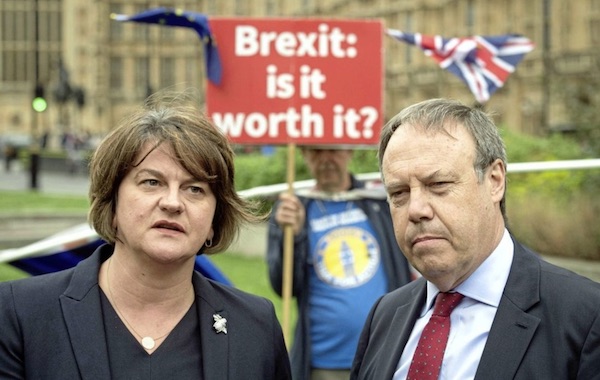
Brian Feeney (for Irish News)
Fundamentally Ulster unionism came into existence over a century ago as a political route to avoid living on equal terms with the rest of the people on this island.
Of course there were other elements in the mix like bigotry, ethnic hatred, anti-Catholicism, notions of supremacy, though supporting all those reasons was not a necessary requirement for supporting unionism. As a political ploy however, unionism acted as an umbrella for all those elements; it filled the bill.
The latest ploy unionism has taken up is the notion of consent. They claim, on the basis of nothing whatsoever, that there can’t be any Brexit deal that doesn’t have unionist consent. Some in the DUP even claim that any deal without their say-so would be a breach of the Good Friday Agreement.
That’s an astonishing piece of hypocrisy, even for unionists. After all, the DUP oppose the Good Friday Agreement, though, whisper it, they accidentally signed up to it in the confidence and supply agreement with Theresa May, so eager were they to land it. Nevertheless, one of their chief spokesmen on Brexit, Jeffrey ‘I could live with 40,000 job losses’ Donaldson, walked out on David Trimble on the day of the GFA. Now it’s the holy grail.
On the other hand, it never occurred to the DUP to seek the consent of nationalists for Brexit before they rushed off to Westminster to advocate the hardest Brexit which would guarantee a newly solidified British border in Ireland. Their leader in Westminster, Depooty ‘no deal is better than a bad deal’ Dawds, in defiance of a substantial majority in the north, has spent the last three years misrepresenting people here without ever asking the consent of that majority.
Some people who should know better have bought the DUP line that they must consent to any change here. Fine Gael Minister Pascal Donohoe last week rejected the DUP claim that their consent to any backstop was needed, but then added that it is possible to ‘amplify’ the consent provisions in the GFA. No it isn’t. What the DUP are trying to do is to extend the requirement that the consent of a majority in the north is required for constitutional change – and note, it’s the consent of a majority – into a guarantee that consent of political unionism, now a minority, is needed for any change. In other words an attempt to resurrect the unionist veto which political unionism wielded since their military wing the UVF brought the gun into Irish politics in 1913. They lost it in 1985. Surely that’s not what Donohoe was implying?
The notion of parallel consent applies only to measures introduced by a party in a Stormont assembly, if one ever reassembles, not to measures introduced by a UK government. After all, the UK government has made provision for abortion here despite unionist dissent. Besides, the idea that a regional assembly could somehow decide what divergence from EU standards in food or manufactured goods could be permitted is something Brussels could never accept.
Last year Lord Trimble and his adviser, unionist historian Lord Bew, toyed with the idea of going to court to show that absence of unionist consent for measures in Theresa May’s Withdrawal Agreement, especially the backstop, contravened the GFA. It’s telling that, on mature reflection, as Brian Lenihan used to say, they decided to save their money.
Luckily, despite the willingness of Irish ministers to ‘understand the fears of unionists’, curiously never needing to consider the fears of nationalists, the EU will not allow such appeasement because it would damage the single market. Michel Barnier has pointed out this red line explicitly in the last week. Equally Michelle O’Neill has made it clear Sinn Féin would never accept an arrangement whereby the DUP would be able to exercise a veto in an assembly or anywhere else.
When unionists talk about consent, read a veto. It’s useful to remind the Irish government of that.
![[Irish Republican News]](https://republican-news.org/graphics/title_gifs/rn.gif)
![[Irish Republican News]](https://republican-news.org/graphics/title_gifs/harp.gif)

